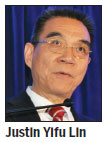Market time is 'now' for China's economy
China's dual-track system has served the country well but now the time has arrived for the mainland to let the market play a more decisive role in the economy, said Justin Yifu Lin, a professor and honorary dean at the National School of Development at Peking University.
Lin, also a former senior vice-president and chief economist at the World Bank, gave the keynote address at the National Committee on US-China Relations' Forecast for China's Economy for 2016 Thursday in New York.
"China is the only emerging-market economy not to experience a crisis," he said. One of the reasons for that is the country's reliance on its plan of providing government assistance to industries to establish a modern economy that was lacking in China in 1979, while gradually transitioning to a market economy, according to Lin.
Lin said the time has come for China to downplay dual-track development. "Firms should be viable without government subsidies," he said.
As China progresses to a more market-oriented economy, growth will not return to the double-digit advance that was common several years ago. "The growth target of 6.5 percent or more (in the 13th Five-Year Plan for 2016-2020) is about 30 percent less than in the past," said Lin.
In a panel discussion on China's economy for this year and beyond, Lu Feng, a professor at the National School of Development and director of the China Macroeconomic Research Center at Peking University, noted that even as the country's economic growth has slowed, the labor market has been relatively stable.
Feng said this is due to migration from rural to urban and through the growth of non-farming jobs. "Because employment is relatively good, income growth has been good," Feng said. This has helped retail sales to grow from 9-10 percent a year, he added.

Feng said China's goal "is to create Xiaokang which means a moderately prosperous society in all respects."
Yao Yang and Xu Gao discussed China's debt situation. Yang, a professor at the China Center for Economic Research and the National School of Development, said he doesn't accept the conventional wisdom that China's government sector is burdened by too much debt.
"Most of China's government debt has been spent on infrastructure and not consumption," said Yang. "There are huge returns on investment in infrastructure like high-speed rail."
Gao, the chief economist for China Everbright Securities Co Ltd, was even blunter. "China doesn't have a debt crisis," he declared.
Gao said the possibility of a debt crisis in China is low and noted that the debt to asset ratio has remained stable.
One of the differences between China and the West is the mainland's corporate sector is a saver "because it doesn't distribute profit to shareholders.
"If there is no debt in China," Gao continued, "it's not only bad for China, but the world economy as well."
paulwelitzkin@chinadailyusa.com


















